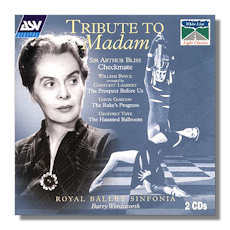
The Internet's Premier Classical Music Source
Related Links
-
Bliss Reviews
Lambert Reviews
Toye Reviews - Latest Reviews
- More Reviews
-
By Composer
-
Collections
DVD & Blu-ray
Books
Concert Reviews
Articles/Interviews
Software
Audio
Search Amazon
Recommended Links
Site News
 CD Review
CD Review
Tribute to Madam

Complete Ballets
- Sir Arthur Bliss: Checkmate
- Constant Lambert: The Prospect Before Us
- Gavin Gordon: The Rake's Progress
- Geoffrey Toye: The Haunted Ballroom
Royal Ballet Sinfonia/Barry Wordsworth
AS&V CDWLS225 151:34 2CDs
Summary for the Busy Executive: Looks better in the jewel case than it sounds on a player.
Unlike Russia and France, England took a while to establish a viable ballet company. Things began to look up when dancer and choreographer Ninette de Valois (born a very Irish Edris Stannus and known as "Madam") and her house composer and conductor, Constant Lambert, began the group that eventually became the Royal Ballet. Diaghilev's Ballet Russe had made a huge impact in London and his approach – directing a seamless collaboration among top-flight composers, designers, and dancers – influenced Madam enormously. We also ought to mention Marie Rambert, less successful commercially, but far more adventurous musically, mainly because unlike Valois, she didn't mind going beyond England in search of composers. She essentially discovered Frederick Ashton, who in the mid-Thirties moved to Valois's company. Valois's most successful musical commission by far was Ralph Vaughan Williams's Job, with Bliss's Checkmate not far behind. Lambert contributed uniformly excellent work but confined himself mostly to arrangements of music by others. Much of the rest of Valois's commissions fall under the category of very well-made light music, which may indeed have contributed to her box-office successes. In that sense, this CD fairly represents her.
Most of the works on this CD don't measure up musically to the Tchaikovsky or Stravinsky ballets by any means. Lambert's Prospect Before Us arranges and reassembles with exquisite taste music by the 18th-century Master of the King's Music William Boyce. Lambert had prepared a scholarly edition of Boyce for, I believe, Oxford University Press, so this was duck soup to him. Still, it doesn't interest me as much as Lambert's original ballets. Gavin Gordon's Rake's Progress delights rather than instructs. It's good enough to make you wish that it were better. It almost breaks through to something memorable.
Geoffrey Toye, better known as a conductor than as a composer, contributes The Haunted Ballroom, the waltz from which became a radio hit during its run as the musical signature of the BBC Light Programme. Toye also provided the story, about the male heirs of a Scottish clan doomed to dance themselves to death. If the story sounds familiar to you, you should also know that in 1919 Toye arranged what has become the standard overture to Gilbert and Sullivan's Ruddigore, replacing the original by one of Sullivan's assistants (could it have been Cellier?). Like The Hitchhiker's Guide to the Galaxy's description of earth, Toye's Haunted Ballroom is "mostly harmless," with very little drama. There's more in Ruddigore, and that's a spoof.
The big news, however – and, as far as I'm concerned, the raison d' être for the disc – is the first commercial recording of the complete Checkmate. Until now, we've had only the five-movement suite out of a total of a dozen. Essentially, we've had less than half the music. However, since this disc appeared, Naxos released a complete Checkmate, coupled with Bliss's early Mêlée Fantasque, led by David Lloyd-Jones. If you have no interest in anything other than the Bliss (and you do pay for two CDs with the AS&V), I'd go with the Naxos. Also the sound is better and the performance more exciting.
I don't know what it is with Barry Wordsworth, but in general he has not impressed me. The performances are all okay, but nothing more. The Bliss and the Lambert come off best, but you can easily imagine a more gripping reading. That just about sinks this release.
Copyright © 2009, Steve Schwartz




















